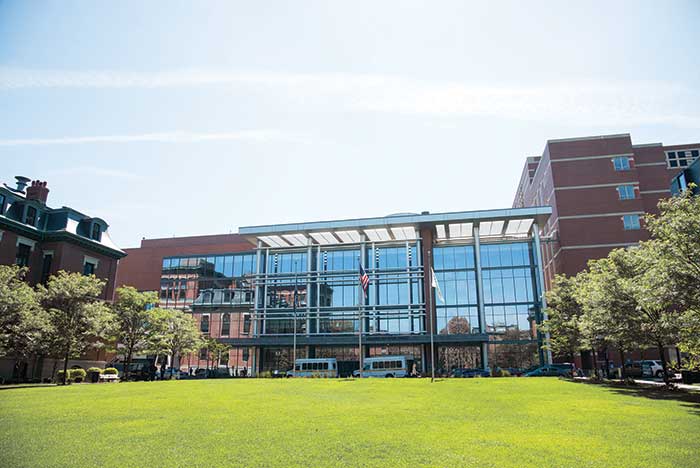Boston hospitals continue to set the pace for reducing emissions

Boston Medical Center is one of the hospitals contributing to the city's sustainability success. The hospital is on track to reduce emissions by at least 50 percent by 2018.
Boston-area hospitals are on track to reduce greenhouse gas emissions by 33 percent by 2020, continuing a trend that began with a substantial drop in energy use and emissions between 2011 and 2015, according to a new report released by international sustainability coalition Health Care Without Harm (HCWH).
Data from 20 hospitals serving on the Boston Green Ribbon Commission’s Health Care Working Group show that health facilities reduced their energy use by 9.4 percent and emissions by 29 percent from 2011 to 2015, the report states. HCWH’s report analyzed more than 24,000 records covering 22 million square feet of hospitals.
“Boston hospitals are leading other sectors in the city, and pacesetting the entire health care industry, demonstrating that they can provide exceptional patient care, protect public health and dramatically reduce greenhouse gas emissions,” says Gary Cohen, president and co-founder, HCWH.
With the reduction, Boston health care facilities are ahead of greenhouse gas emission reduction goals set by Boston and Massachusetts, which have mandated emissions cuts of 25 percent by 2020 and 100 percent by 2050.
The report identifies areas in which Boston hospitals made notable progress during that time period compared with “business as usual” average annual energy increases of 1.5 percent. Business as usual represents increased use of medical and other equipment, more patient care, expansion and other factors that cause hospital energy use to rise each year.
Twenty percent of health care system emission reductions derive from investments in renewable energy. For example, Partners HealthCare is purchasing low-impact hydropower, and will buy most of its electricity from a new wind turbine farm in New Hampshire. Its goal is to become net carbon positive for all energy by 2025.
Boston Medical Center is cutting energy use and neutralizing its electricity emissions in part through energy generated by a North Carolina solar farm. It expects all energy to be climate neutral by 2018.
“We’re on track to reduce emissions by at least 50 percent by 2018, saving over $8 million every year,” says Bob Biggio, senior vice president of facilities and support services, Boston Medical Center. “These are resources that we invest directly back into high-quality patient care and more green energy initiatives.”
The greenhouse gas emission reductions come while the hospitals provide more patient care, conduct energy-intensive medical research, expand facilities and cope with climate issues, according to the report.
“Climate change is one of the single largest threats to public health. That’s why Partners is committed to addressing both the causes and the impacts,” says John Messervy, AIA, corporate director of design and construction at Partners HealthCare Inc.
“We have invested millions systemwide on energy — achieving a 35 percent reduction at Massachusetts General Hospital, for example — all to save money and improve the health of the patients and communities we serve. Our plan to be net carbon positive by 2025 demonstrates leadership in the sector, the city and beyond,” he says.
Even with the progress achieved, hospitals have some work to do to reach their ultimate goal of 100 percent greenhouse gas emission reduction by 2050.
“To achieve carbon neutrality by 2050, we need radical changes in how we power, heat and cool our buildings,” says John Cleveland, executive director, Boston Green Ribbon Commission.
Still, commission leaders are optimistic about hospitals not only hitting the target, but also setting an example for others.
“The remarkable achievements of Boston hospitals show this transformation is doable even now. Boston health care is setting the pace for our other sectors, other cities and, indeed, the entire country. We hope others rise to this friendly challenge,” Cleveland says.
The full HCWH report can be found at https://noharm.org/boston.




